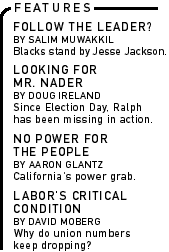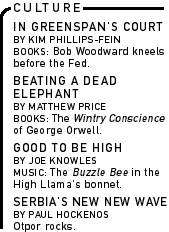

|

|

|

|
| |
|
|
|
Orwell: Wintry Conscience of a Generation It is the face of a man who is always fighting against something ... the face of a man who is generously angry--in other words, of a nineteenth century liberal, a free intelligence, a type hated with equal hatred by all the smelly little orthodoxies which are now contending for our souls." This is George Orwell writing in 1939 on Charles Dickens, but these words could just as well describe Orwell himself. Orwell may have felt hated by the smelly little orthodoxies of his time, but since his death his soul has been up for grabs. For the non-Communist left, Orwell has been the exemplar of small "s" socialist decency; for the right, a prophet against totalitarianism. What other writer could unite Christopher Hitchens and Norman Podhoretz under the same banner? But Orwell was sui generis, and his own fiercely guarded independence has meant that
Any biographer of Orwell has to take into account the often conflicting impulses that made up his sometimes maddening character. He is a hard subject to pin down. The Road to Wigan Pier so infuriated its publisher, Victor Gollancz, because of its vituperative asides on socialists that he wrote an introduction alerting the reader to Orwell's rather eccentric opinions about the left. "He is at one and the same time an extreme intellectual and a violent intellectual," Gollancz noted. "Similarly he is a frightful snob ... and a genuine hater of every form of snobbery." So just who was Orwell? He was clearly his own man. Or many men, as Jeffrey Meyers writes in his new biography, Orwell: Wintry Conscience of a Generation: "Orwell never could--perhaps never wanted to--resolve the contradictions of his elusive character: Etonian prole, anti-colonial policeman, bourgeois bum, Tory anarchist, Leftist critic of the Left, puritanical lecher, kindly autocrat." This is a perceptive remark in an otherwise uninspired biography, one filled with the usual glib hallmarks of Meyers' style. A depressingly industrious biographer, Meyers has made a career writing superficially learned literary biographies. Despite the book jacket's promise of "research into unpublished material in the Orwell archive in London," and the availability of the massive 20-volume edition of Orwell's collected works, this is a largely superfluous work that adds little to our knowledge of Orwell's life. Born Eric Blair in colonial Burma in 1903, the young Orwell was soon shipped home with his mother to England, where he lived a comfortable life as a member of the "lower-upper middle class," as he once described it. Schooled at St. Cyprian's and Eton, Orwell graduated without many prospects; he was a horrid student. Instead of the usual Oxbridge route of his peers (like Anthony Powell and Cyril Connolly) Orwell opted for the Burma police force, following his father's footsteps. He was to spend seven years there, witnessing first-hand the brutalities of empire; upon his return to England in 1927, he wanted nothing to do with a society founded on imperialism and oppression. As he wrote in one autobiographical passage in Wigan Pier: "I felt that I had got to escape not merely from imperialism, but from every form of man's dominion over man. I wanted to submerge myself, to get right down among the oppressed, to be one of them and on their side against the tyrants." He threw his lot in with the downtrodden and tramped around East London and Paris, changing his name to George Orwell upon publication in 1933 of his first book, Down and Out in Paris and London, a semi-documentary account of his time as member of the bohemian demi-monde. By the '30s, the Orwell we know was beginning to emerge: passionate, obsessed with politics, preoccupied with the state of England and the rise of fascism in Europe. These latter two concerns produced his two most famous works of nonfiction, The Road to Wigan Pier and Homage to Catalonia. In the biography's account of Orwell's time as a militiaman in Spain, where he was nearly killed after taking a bullet in the throat, Meyers benefits from some new material--most importantly an arrest warrant that proves the Communists were after Orwell. This will no doubt please neocon revisionists like Ronald Radosh, who will use it to further cast doubt on the Republicans' cause--which Orwell passionately believed in, despite the Communist interference. Nonetheless, Spain was a chastening experience for Orwell. Unlike other writers who took up the Republican cause but were mere observers (like W.H. Auden and Stephen Spender) Orwell experienced ideological warfare first-hand, and bitterly attacked Auden and Spender as mere hand-wringers. Orwell came home a bitter foe of Communism, and blamed the left-wing press profusely for their distortions of the Spanish cause. But his belief in his own brand of socialism remained undimmed. During World War II, he broadcast regularly for the BBC, and wrote some his finest essays, including "The Lion and the Unicorn," where he outlined his views on England and socialism. In 1945 Orwell's satire Animal Farm was published, prompting his friend William Empson to write, "You must expect to be misunderstood on a large scale." And misunderstood he was. Animal Farm and its successor, 1984, may be the two most talked-about books of the 20th century. Yet no less than five publishing houses rejected the manuscript of the former. Orwell had to contend with a reservoir of pro-Soviet sentiment, which reached its high-water mark after the Allied defeat of the Nazis. Of all people, even the self-described Anglo-Catholic royalist T.S. Eliot declined to publish the novel at Faber and Faber, telling Orwell "that this was not the right point of view from which to criticize the political situation at the present time." Eventually, of course, Animal Farm was a commercial and critical smash, getting a boost in the American press from Edmund Wilson and Arthur Schlesinger Jr. After this success, Orwell completed 1984 on Jura, a remote island off the coast of Scotland. He ruined his health there, nearly drowning in a boating accident; recurring bouts of bronchitis developed into tuberculosis, which ultimately killed him in 1950. But not before Orwell finished the novel, perhaps the best thing ever written on totalitarianism (both Nazi and Soviet) and certainly one of the most haunting and poignant. And yet today his legacy is still contested. Intellectuals still debate his every move--witness the recent contretemps over the list of fellow travelers Orwell compiled before his death. Alexander Cockburn harrumphed and spit bullets at Orwell in the pages of The Nation, calling him an outright snitch who did real damage to the ranks of the left, and contending that he provided "moral cover for all the Namers of Names who came after him." To be sure, cold warriors applauded the publicity for Orwell with a "see, he really was one of us" arrogance that misses the mark. What Orwell compiled was in many ways a bitchy catalogue of gossip and speculation--yes, marred by remarks that are crudely racist and homophobic to contemporary tastes--that he traded with his friend (and later literary executor) Richard Rees. If anything, the list proves Orwell was insecure and a little neurotic, two qualities that are hardly surprising to anyone familiar with his work. (Of the list, Orwell noted "it isn't very sensational.") It was a question of degree, something Cockburn seemingly did not, on the evidence of his columns, take into account. In the end, unlike two other contemporaries, Ignazio Silone and
Arthur Koestler, both of whom have been tarred by recent scandals,
Orwell's reputation still stands high and will likely continue to.
It is impossibly hard to damn him--partly because he was forthright
about his own faults. Biographers love him: There is yet another
life of Orwell in the works. But Orwell himself once told a housekeeper
that he was the only person who could adequately write his biography.
He was probably right. Matthew Price is associate editor of Lingua Franca.
|


